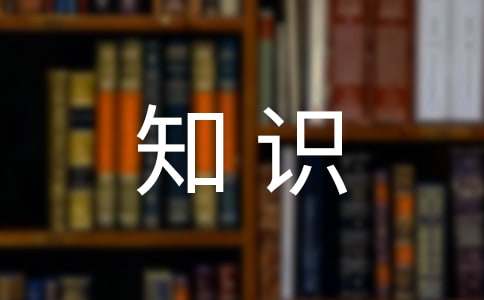- 相關(guān)推薦
初二下冊(cè)英語第一單元知識(shí)點(diǎn)總結(jié)
現(xiàn)代英語所使用的拼寫字母,也是完全借用了26個(gè)字母。所謂“英語字母”,就是古羅馬人在書寫時(shí)所使用的拼寫字母。下面是小編整理的關(guān)于英語第一單元知識(shí)點(diǎn)總結(jié),歡迎大家參考!

一、基礎(chǔ)知識(shí)
1. What’ s the matter? 怎么啦?出什么事情了?
【解析】matter/ ' mætə(r)) /n.問題;事情
What’ s the matter with you?= What’s the trouble with you? = What’ s wrong with you? 你怎么了?
【注】: matter 和trouble 為名詞, 其前可加the 或形容詞性物主代詞,wrong 是adj. 不能加the
【用法】用于詢問某人有什么病或某人遇到什么麻煩、問題其后跟詢問對(duì)象時(shí), 與介詞with連用。即:
What’s the matter with sb.? = What’s your trouble? = What’s up? = What happens to sb.?
— What’s the matter with you ? — I have a bad cold.
2. I had a cold.我感冒了。 have a cold=catch a cold=have the flu感冒
have a fever 發(fā)燒 have a cough咳嗽 have a stomachache胃疼,肚子疼 have a toothache牙疼 have a headache頭疼
3. 身體部位+ache(疼痛)構(gòu)成新的復(fù)合詞
stomach+ache=stomachache head+ache=headache tooth+ache=toothache back+ache=backache后背痛
4. much too+ 形容詞,意為 太...... ,too much+名詞,意為 很多,大量 。
5. enough【形容、副詞】足夠的/地,enough放在名前后,形副后。good enough足夠好,enough money=much money
6. lie down躺下, lie 躺,躺著,過去式lay;lie說謊,過去式lied
7. maybe “或許”,常用于句首,表示可能性,后加句子。Maybe you are right.
may be,是情態(tài)動(dòng)詞+be的結(jié)構(gòu),意為“可能,也許”,后加名詞、代詞或形容詞。He may be angry.
sound like+名詞代詞和從句:It sounds like you don’t know the truth.
It sounds like a good idea. sound+形容詞,“聽起來,好像”,The music sounds nice.
9. need 需要,實(shí)義動(dòng)詞need+名詞,需要某物;
need to do sth.需要做某事,主語通常是人,表示人主動(dòng)的動(dòng)作:You need to listen carefully during class.
need doing sth.主語通常是物,表示被動(dòng)的動(dòng)作:Your dirty clothes need washing.
10. get off (the bus) 下(公交車) get on 上車
11. agree 同意,贊同;
agree with sth. 同意某事 如:I agree with that idea.
agree to sb. 同意某人的意見 如:I agree to LiLei.
12. trouble問題,麻煩 ;be in trouble遇到麻煩,make trouble 制造麻煩 ,have trouble (in) doing sth. =have difficulties (in) doing sth做......有麻煩。
13. right away=right now=at once,意為 馬上 。
14. advice [不可數(shù)名詞]勸告,建議,向…征求意見, give sb. advice on sth.就某事給某人建議; advise [動(dòng)詞] advise sb. to do sth. 建議某人做某事
advise sb. doing sth.
【復(fù)習(xí)】exercise 練習(xí)、鍛煉
當(dāng)exercise意為“練習(xí)”時(shí),為可數(shù)名詞 即可加s
當(dāng)exercise意為“鍛煉”時(shí),為不可數(shù)名詞 即不加s
16. hurt 及物動(dòng)詞,使……疼痛,……受傷,He hurt his leg while exercising.
不及物動(dòng)詞,……(部位)疼。 His leg hurt badly.
clean 【動(dòng)詞】打掃,clean the classroom打掃教室,【形容詞】 干凈的 ,cleaner意為 清潔工 。
18. hit (用手或器具)打;擊打 The boy hit the dog with a stone.
hit sb. on the head/ nose/ back打某人的頭、鼻子、后背,on用在所打較硬的部位;
hit sb. in the face/ eye/ stomach 打某人的臉、眼睛、肚子,in用在所打較軟的部位。
be used to sth./ doing sth.習(xí)慣于、適應(yīng)了……、做某事,強(qiáng)調(diào)狀態(tài);His grandpa was used to country life.
Mary is not used to getting up early in the morning.
get/ become used to sth./ doing sth. “變得習(xí)慣,逐漸適應(yīng)……”強(qiáng)調(diào)過程、動(dòng)作:
It’s difficult for one to get used to another country’s habit.
20. 【復(fù)習(xí)】free [形容詞]空閑的free time;免費(fèi)的the drink is for free;自由的I want to become a free bird.
free【動(dòng)詞】使……解脫,得到自由:He could not free his arm.
run out用完,用盡 When his water run out, he knew that he would have to do something to save his own life.
物sth. run out. 某物用盡了。
人sb. run out of sth. 人用盡了某物。He run out of all his money last night.
22. risk (sb.) to do sth. 冒險(xiǎn)去做某事 take a risk=take risks 冒險(xiǎn)
23. the importance of (doing) sth.(做)某事的重要性
We students should know the importance of (learning) English.
importance n. 重要(性), important adj.重要的,unimportant adj.不重要的
decision 【名詞】決定;抉擇; make a decision 做決定 ;
make a decision to do sth.= decide to do sth. 。
25. be in the control of …掌管,管理 The headmaster is in the control of this new school.
be out of control無法控制,無法管理 be under control被控制住,在控制之中
26. 【復(fù)習(xí)】mind意為 介意 ,mind doing sth. 介意做某事 ,
Would you mind my opening the window?
27. give up (doing) sth. 放棄(做)某事,give up (playing) computer games;
give up后可接名詞、代詞和動(dòng)詞ing形式,也可不接,如: Never give up easily.
二、重點(diǎn)語法
【反身代詞】英語中共有八個(gè)反身代詞,在使用時(shí)應(yīng)注意和它所指的相應(yīng)的對(duì)象在人稱、性別、數(shù)上保持一致。
數(shù) 人稱 第一人稱 第二人稱 第三人稱
單數(shù) myself yourself himself herself itself
復(fù)數(shù) ourselves yourselves themselves
【用法】
1. 可用作賓語,指的是賓語和主語表示同一個(gè)或同一些的人或事物。
如:Maria bought herself a scarf. We must look after ourselves very well.
2. 可用作表語,指的是表語和主語表示同一個(gè)或同一些人或事物。 如: She isn’t quite herself today.
3. 可用作主語或賓語的同位語,常用來加強(qiáng)語氣。
如:She herself will fly to London tomorrow. I met the writer himself last week.
4. 用在某些固定短語當(dāng)中。
look after oneself / take care of oneself 照顧自己 teach oneself sth./ learn sth. by oneself自學(xué)
enjoy oneself 玩得高興,過得愉快
help oneself to sth 請(qǐng)自用……(隨便吃/喝些……).
hurt oneself摔傷自己
say to oneself自言自語
leave sb. by oneself把某人單獨(dú)留下
buy oneself sth.給自己買……東西
introduce oneself 介紹……自己
【提醒】
1. 反身代詞不能單獨(dú)做主語,但可以做主語的同位語,起強(qiáng)調(diào)作用。 如:我自己能完成作業(yè)。
(誤)Myself can finish my homework. (正) I myself can finish my homework. / I can finish my homework myself.
2. 反身代詞表示“某人自己”不能表示“某人的東西”,因?yàn)樗鼪]有所有格的形式。表達(dá)“某人自己的(東西)”時(shí),須要用one’s own.
如:我用我自己的蠟筆畫畫。(誤)I’m drawing with myself crayons. (正) I’m drawing with my own crayons.
【初二下冊(cè)英語第一單元知識(shí)點(diǎn)總結(jié)】相關(guān)文章:
初二英語下冊(cè)知識(shí)點(diǎn)總結(jié)08-27
初二政治下冊(cè)知識(shí)點(diǎn)總結(jié)05-17
初二地理下冊(cè)知識(shí)點(diǎn)總結(jié)09-12
初二下冊(cè)力學(xué)知識(shí)點(diǎn)總結(jié)12-12
初二力學(xué)知識(shí)點(diǎn)總結(jié)01-19
初二語法知識(shí)點(diǎn)總結(jié)10-17